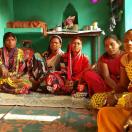Rural India Livelihoods Project
Launched in 2011, the National Rural Livelihoods Mission (NRLM) aims to link the rural poor in India to sustainable livelihood opportunities and financial services. In collaboration with the Ministry of Rural Development and the Bill & Melinda Gates Foundation, 3ie is working to generate rigorous evidence on the impacts of this large-scale program on livelihood promotion and social mobilization.
Spotlight | Working paper

Improving delivery and impacts of pro-poor programs
Taking cognizance of the multi-dimensional nature of poverty, development practitioners call for the linkage or ‘convergence’ of programs for poor populations. It is believed that such convergence will improve the delivery and impact of poverty-alleviation programs by building efficiency. In our latest working paper, we examine how the convergence of two large poverty-alleviation programs – the National Rural Livelihoods Mission with the Mahatma Gandhi Rural Employment Guarantee Scheme (MNREGS) – in the early stages of the self-help group life cycle influences the project implementation and household outcomes. Read more
Other activities | In addition to these, activities we also collaborated with JEEVikA (Bihar Livelihoods Mission) on a management information system of a sanitation program and conducted some formative research to inform the implementation of Project Mesha, a community-based program for goat rearing. For queries about this work, please write to info@3ieimpact.org
Additional reading | Compiled list of World Bank resources on rural growth
Events
- Financial Inclusion Week 2021, 1 November | Improving last-mile delivery of financial services and welfare programs
- India Rural Colloquy, Transform Rural India Foundation, August 2021 | Watch recorded event on women’s collectives and rural economic empowerment
- Livelihoods India Summit, January 2021 | Watch recorded event on the way ahead for NRLM
- Livelihoods India Summit, January 2021 Watch recorded event on empowering women in rural India
- 3ie Evidence Dialogues, October 2020 | Watch recorded event on women’s economic empowerment
- Evidence-informed policymaking for rural transformation, January 2020 | Watch recorded sessions

 Evidence gap map on group-based livelihood interventions in L&MICs
Evidence gap map on group-based livelihood interventions in L&MICs




